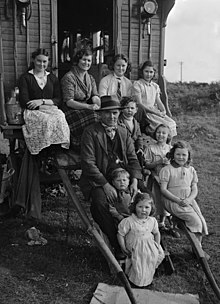Kalé, Kalá, Valshanange | |
|---|---|
 A Kalé family in Bala, Wales, 1951 | |
| Total population | |
| 700 to 1,000[1] (1991, est.) | |
| Regions with significant populations | |
| Northwestern Wales | |
| Languages | |
| Welsh, Welsh Romani and English | |
| Religion | |
| Christianity, Romanipen | |
| Related ethnic groups | |
| Romanichal |
The Kale [kɑː leɪ] (also Kalé, Kalá, Valshanange; Welsh: Roma yng Nghymru, Sipsiwn Cymreig, Cale) are a Romani subgroup predominantly found in northwestern Wales, specifically in the Welsh-speaking areas. Many Kale claim to be descendants of Abram Wood, the first Rom to reside permanently and exclusively in Wales in the early 18th century, although Romanichal have appeared in Wales since the 16th century.[2] Romanichal inhabit South Wales (in and around Cardiff, Swansea and Newport) and North East Wales (in and around Wrexham as well as in parts of Wales close to Liverpool and Chester).
The Kale were traditionally renowned musicians, and are reported to have introduced the fiddle to Wales.[3][4] They were also known for their distinctive styles of clothing, dance, poetry and storytelling.[3][5][6]

The Welsh Kale are closely related to Romanichal, Scottish Lowland Roma, Romanisael and Finnish Kale.[7] They are considered part of the Gypsy, Roma and Traveller (GRT) community.[8]
- ^ Jarman, Eldra; Jarman, A. O. H. (1991). The Welsh Gypsies : Children of Abram Wood (1st ed.). Cardiff: University of Wales Press. ISBN 9780708311066. cited in Clark, Colin Robert (2001). Invisible Lives': the Gypsies and Travellers of Britain (PDF) (PhD). University of Edinburgh. p. 109.
- ^ "Welsh Gypsy, Welsh Gypsies, Kale, Wales". Archived from the original on 2008-06-21. Retrieved 2008-06-10.
- ^ a b "Welsh Romani". Curious Clwyd. Retrieved 2024-07-21.
- ^ "Clera - The Fiddle". www.clera.org. Retrieved 2024-07-21.
- ^ "Pride in Welsh Kale Gypsies' contribution to Wales glows with the inclusivity of storytelling, poetry, harp music and clog dancing". Travellers Times. Retrieved 2024-07-21.
- ^ "Welsh Gypsy, Welsh Gypsies, Welsh Romanies, Kale, Wales". www.valleystream.co.uk. Retrieved 2024-07-21.
- ^ "International Traveller and Roma Day 2019". Parish of the Travelling People. Retrieved 13 July 2020.
- ^ Acton, Thomas; Acton, Jennifer; Cemlyn, Sara; Ryder, Andrew (2016). "Why we need to up our Numbers Game: A non-parametric approach to the methodology and politics of the demography of Roma, Gypsy, Traveller and other ethnic populations" (PDF). Radical Statistics (114). Retrieved 7 January 2024.
